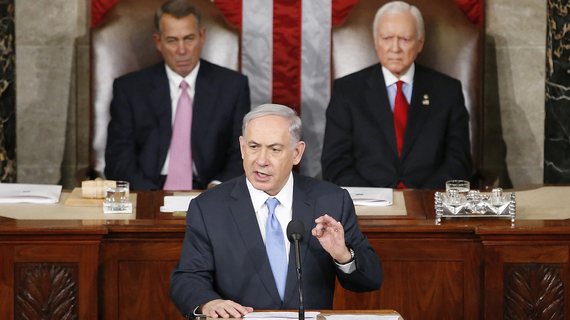In his March 3 speech before the joint session of Congress, Israeli Prime Minister Benjamin Netanyahu reproached President Barack Obama's diplomatic approach to Iran in what seemed to be a symbol of his determination to undermine any future agreement. Nestled between apocalyptic references was the assertion that "the difficult road is the one less travelled." Ironically enough, in the Middle East, the road to war is well worn while diplomacy is the route everyone seems to miss.
Netanyahu's one-liners and combative posture triggered frenzied applause in the Congressional Chamber despite the lack of alternatives offered. In fact, Netanyahu was criticized for failing to propose any; but there are none to propose. If diplomacy is producing a "bad deal" and sanctions are not working, then the only road left is the one that we have been down too many times. Netanyahu recognizes that America is war-weary and that Iran has taken a backseat to something more sinister.
For the U.S., now in the midst of another escalating conflict in the Middle East against the self-declared Islamic State militant group, commonly known as ISIS, a deal with Iran could not come at a better time. Contrary to Netanyahu's admonitions, the American-led coalition could benefit from Iranian military and intelligence contributions. The Iranian regime is fundamentally opposed to ISIS on ideological and political grounds as the latter has declared war on all Shi'ites, whom they consider apostates. According to Netanyahu, the two are "competing for the crown of militant Islam," a comparison that is, at best, dubious, and at worst deceitful. It is hardly worth entertaining the notion that a country with a theocratic-democratic political system whose foreign policy agenda is anathema to Western interests is equivalent to an internationally recognized terrorist organization that is committing acts of genocide, encouraging children to commit suicide bombings, and kidnapping young girls to marry.
The use of fearmongering to undermine diplomatic talks could potentially open the door for Israel to initiate military operations, as it has threatened to in the past. This would leave the U.S. dangerously vulnerable. Would an Israel-Iran war require the U.S. to support Israel, militarily, financially, or rhetorically? Would it open another war front in the Middle East and make the U.S. a target of yet more aggression? Would it complicate and potentially undermine already challenging operations against ISIS? Yes, yes, and yes.
From the U.S. perspective then, diplomacy is the only good option. And as is the case in any serious diplomatic negotiations, the sensible starting point is understanding why Iran seeks nuclear capabilities in the first place. What would Iran do with a nuclear weapon? It certainly would not use them against the United States or Israel, as Netanyahu might have you think. Nobody questions the suicidal nature of initiating a nuclear attack against a far-stronger nuclear state. If Iran bombed Israel or the United States, it would be annihilated. Nor would sharing the technology with terrorists be prudent. Referencing Iran, Barry Posen noted that "no country is likely to turn the means of its own annihilation over to an uncontrolled entity." In short, Iran's desire to acquire to nuclear weapons is not to "wipe Israel off the map," as has become a most beloved mistranslated reference.
Iran's reasons for wanting a nuclear weapon are actually quite rational: Israel has had a nuclear monopoly in the Middle East for more than forty years in addition to a formidable conventional arsenal that is heavily supported by the United States. Meanwhile, sandwiched between Iraq and Afghanistan, Iran was surrounded by U.S. troops for a decade. In fact, shortly after Iran shared vital intelligence with the United States in support for operations against the Taliban, George W. Bush included the country in the "axis of evil." In addition, Iran has been unable to shake its suspicion of the United States after the CIA overthrew one of their democratically elected leaders during the Cold War. And this doesn't scratch the surface of the both subtle and overt threats that both the U.S. and Israel have repeatedly made. The problem for Iran is its desire for security. It is the same desire for security that Israel has. Israel has yet to acknowledge its own nuclear arsenal, has not signed the Nuclear Non-Proliferation Treaty (NPT), and is thus granted legal exemption from official inspections.
This is not to say that Iran should be allowed to acquire nukes. Rather, that talking down the regime requires toning down hostility rather than ratcheting up confrontation. Greater hostility only reaffirms Iran's perceived need for protecting itself.
Convincing a country that feels threatened to give up nuclear ambitions requires making concessions, not painting maniacal images of dictators that will never understand the language of diplomacy. Iran must feel secure enough to forgo the desire to become a nuclear weapon state. Yes, they may want to maintain a conventional arsenal that includes ICBMs. Yes, they may look for economic incentives and a reduction of sanctions. Yes, they may demand that Israel's arsenal be subject to the same international scrutiny that NPT states face. That is the basis of diplomacy. For Israel, all of this would constitute a "bad deal." But neither Israel nor Iran can expect all of their demands to be fulfilled. The "no deal is better than a bad deal" mantra applies to all sides, including Iran. If Iran gets nothing -- as Netanyahu would have it -- there will be no deal. Reaching a resolution requires all sides to take the high road.

